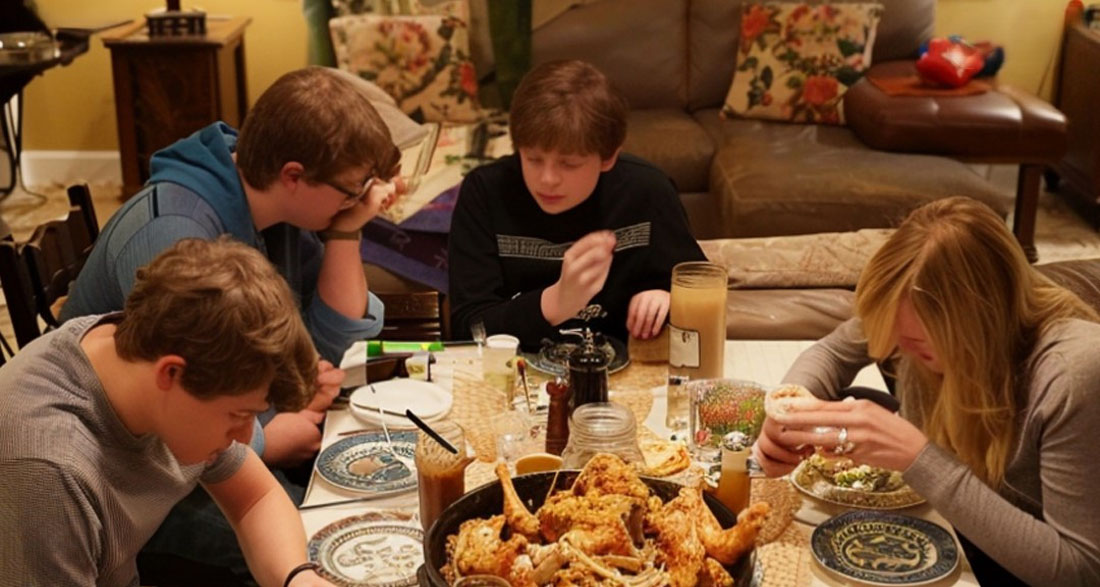Standing Up for Love
My wife, Megan, really loved our family’s monthly dinners. She put her heart and soul into every meal, hoping everyone would enjoy it. But instead of gratitude, she got hurtful comments from my relatives. After seeing her in tears too many times, I decided to take action. I planned a secret test to figure out why they were being so harsh. What I discovered broke my heart.
Our family has a long tradition of monthly dinners that started with my grandmother. She wanted to bring her siblings together over delicious meals and create lasting memories. My dad and his brothers and sisters kept this tradition alive, and I remember those dinners as the best times of my childhood.
These dinners were not just meals; they were full-blown events! My dad would go all out with decorations, turning our home into a festive place. My mom always made sure there were at least three main dishes. I even remember one time when Dad ordered pizza for us kids, making it a fun and unforgettable party night!
Now that my siblings and I are adults, we’ve continued this tradition. A few months ago, my older sister Angela hosted one of these dinners, and her chicken pie was such a hit that even Megan couldn’t stop raving about how delicious it was.
Hosting these dinners rotates among the siblings. When it’s our turn, Megan and I welcome about 13 or 14 family members, including my two older siblings, Angela and Dan; my two younger siblings, David and Gloria; and sometimes even my Aunt Martha.
Megan was thrilled to join this tradition and took over the cooking early on because, as she said, “I find it so therapeutic.”
But the first time we hosted after she took charge, things went terribly wrong. As soon as Angela took her first bite, she exclaimed, “I knew it! This chicken is so bland!” Dan jumped in with, “Why is it so dry?” Even my mom added, “Maybe use less seasoning next time.” I could see Megan’s smile fading as their harsh words piled up.
I tried to cheer her up. “The chicken is perfect,” I said, hoping to lift her spirits. “What do you think, David?”
David smiled warmly. “It’s really nice. I love it.”
But the damage was done. Later that night, I found Megan in the bedroom, tears streaming down her face. “I won’t cook for them again,” she said, her voice shaking. “They hate everything I make.”
I felt terrible. I wanted to encourage her, so I convinced Megan to give it another shot at the next dinner. She poured her heart into the meal again, cooking my mom’s favorite roasted chicken and Angela’s beloved red sauce pasta. She spent hours perfecting the recipes, determined to impress everyone. But when the food hit the table, the same scene unfolded.
“This pasta is awful,” Angela declared, scrunching her nose in disgust. “I’ll send you my recipe,” my mom added, discreetly spitting out a bite of chicken into her napkin. Megan sat in silence, holding back tears until she could escape to the kitchen.
I followed her. “Your cooking is incredible,” I assured her. “I don’t understand why they’re acting like this.”
Megan looked at me, her eyes filled with sadness. “Why do they hate me?”
Her words lingered in my mind. Were they really being this cruel on purpose? I needed to find out. So, I suggested a plan. At our next dinner, we would serve Megan’s food, but I would take credit for it.
Megan was hesitant, afraid of more humiliation, but eventually, she agreed. She prepared the same roasted chicken and red sauce pasta again. When our guests arrived, I announced with confidence, “I cooked everything tonight.”
The response was incredible. “This is the best pasta I’ve ever had!” Angela said, her eyes lighting up. “I’m glad you’re back in charge,” Dad added, nodding in approval. Even Mom raved, “Now this is how roasted chicken should taste!”
David and Gloria struggled to hide their laughter as our relatives praised every dish. I exchanged a glance with Megan, who gave me a knowing smile. It was clear: the same dishes they had criticized when they thought Megan cooked them were now being called perfection.
I couldn’t stay quiet any longer. “So, you all loved the food, right?” I asked, a hint of challenge in my voice.
They nodded enthusiastically.
“Well, Megan made everything,” I revealed, my voice strong. “The same dishes you’ve been criticizing for months.”
The room fell silent. My mom’s face turned bright red, and Angela suddenly found her drink very interesting. My dad tried to save face. “Well, maybe her cooking has improved,” he muttered, clearly embarrassed.
That night, Megan and I decided to stop hosting the dinners. “You deserve better than this,” I told her. “I’m done with their toxic behavior.”
Megan hesitated. “But it’s your family’s tradition. You should still go.”
“I don’t care about traditions anymore,” I said firmly. “They disrespected you, and I won’t tolerate that.”
We skipped the next few dinners, and soon my family began to notice. When my mom called to ask why, I told her the truth. “You’ve been cruel to Megan for no reason. We’re not coming back.”
“Brandon, you’re ruining your relationship with us because of her!” my mom yelled, her voice filled with frustration.
“I’m standing by my wife,” I said firmly. “If you can’t respect her, you don’t respect me.”
Later, Gloria confirmed what I had suspected. “Mom and Angela never approved of Megan,” she admitted. “They think she’s too different and not ‘family enough.’”
Gloria’s words solidified my decision. Megan deserved love and appreciation, not judgment and ridicule. From that moment on, we focused on creating our own traditions—ones filled with kindness and mutual respect.
In the end, I realized that what truly matters isn’t keeping up appearances or clinging to old customs. It’s about standing up for the people you love and building a life where everyone at the table feels valued.
What do you think of the story? Share your thoughts in the comments below!














